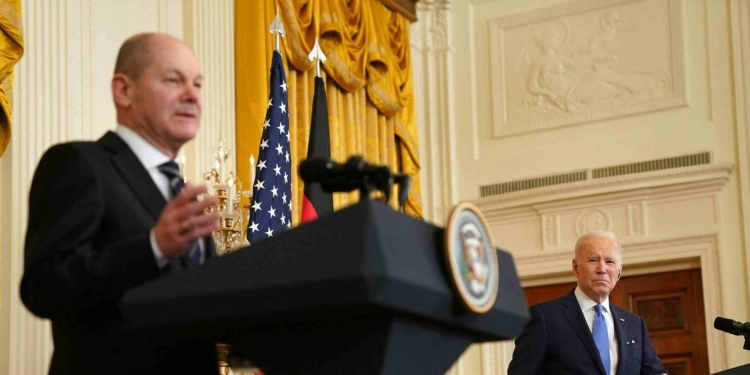This article was originally published by Radio Free Europe/Radio Liberty and is reprinted with permission.
German Chancellor Olaf Scholz again ruled out sending long-range Taurus missiles to Ukraine, opposing actions that would “deliver destructive weapons” deep inside of Russia, and hitting out at his conservative political rival, who has expressed more openness to delivering such weapons to Kyiv.
“I do not think it is right to deliver destructive weapons deep into the Russian hinterland,” Scholz said on February 9 during a 90-minute televised debate ahead of national elections in two weeks.
“That is, I believe, exactly the kind of step not to make if you carry responsibility for Germany,” he added.
Friedrich Merz, whose conservative CDU/CSU alliance is leading in the polls against Scholz’s center-left SPD, said he has “always been very clear” regarding his position on sending Taurus missiles to Ukraine.
“I have always said the delivery of cruise missiles must be decided in the European Union. The United States delivers, France delivers, Britain delivers; we should also have delivered,” Merz said.
Merz told German media in October that he would approve delivery to Kyiv of the missiles — which have a range of some 500 kilometers — under certain conditions.
If Russian strikes on Ukraine “don’t stop, then the first step is this: Lift the range restriction [on current Ukraine missile launchings]. And the second step is that we deliver the Taurus,” he said.
That way, he added, Russian President Vladimir Putin “has it in his hands how far he wants to escalate this war further.”
Germany’s DW reported in July that Merz spoke in favor of Berlin aiding Kyiv to protect against Russian aggression and supply it with combat aircraft.
“I believe that we should help Ukraine at least restore sovereignty over its own airspace,” he was quoted as saying.
Although Scholz has been reluctant to send Kyiv heavy weaponry, Berlin trails only Washington in the amount of support provided to Ukraine. Scholz has insisted that it is essential to secure the “sovereignty of Ukraine and [ensure] that it will not be forced to submit to a dictated peace.”
In November, Scholz attacked the final declaration of the G20 summit in Rio de Janeiro for not plainly stating that Russia was responsible for the war in Ukraine, even as he restated his opposition to sending long-range missiles to Kyiv.
“In my view, supplying cruise missiles would be a mistake for many reasons,” he said at the time — including the danger that it would bring Germany closer to direct conflict with Russia.
Domestically, Scholz, seeking a bounce-back in the polls ahead of the February 23 election, accused Merz of seeking support from the far-right Alternative for Deutschland (Germany) or AfD, which would break the taboo against the mainstream parties in the country cooperating with the party.
Following World War II, Germany has done “very well in the past decades when the democratic parties agreed not to cooperate with the extreme right,” Scholz said.
Merz underlined that his Christian Democratic Union (CDU) and Bavarian CSU allies would not cooperate or rule with the virulently anti-immigration AfD.
“I want to make it clear here once again that we will not do that,” Merz said. “There are no similarities between the AfD and the [CDU/CSU].”
The CDU/CSU alliance, which is polling at about 30 percent, has itself pressed for tougher immigration policies in an effort to draw voters away from the AfD, which is polling at around 20 percent.
Scholz said Merz’s proposal to reject all migrants at Germany’s borders “contradicts European law.”
Scholz’s Social Democrats and the Greens each are at around 15-18 percent support ahead of the vote for the next parliament, or Bundestag.
ING bank analyst Carsten Brzeski wrote that the debate likely ended in a draw and — though heated at times — was relatively “well-behaved,” which could leave open the possibility of a “grand coalition” involving the CDU and other groups in an effort to shut out the AfD, which has been accused of having ties to Russia.
Initial public opinion polls also scored the two politicians’ performances in the debate as roughly equal.
Scholz and Merz are scheduled to meet again in a head-to-head debate on February 19.
They are also scheduled meet in a four-way debate on February 16 with AfD’s Alice Weidel and Vice Chancellor Robert Habeck from the Greens.




